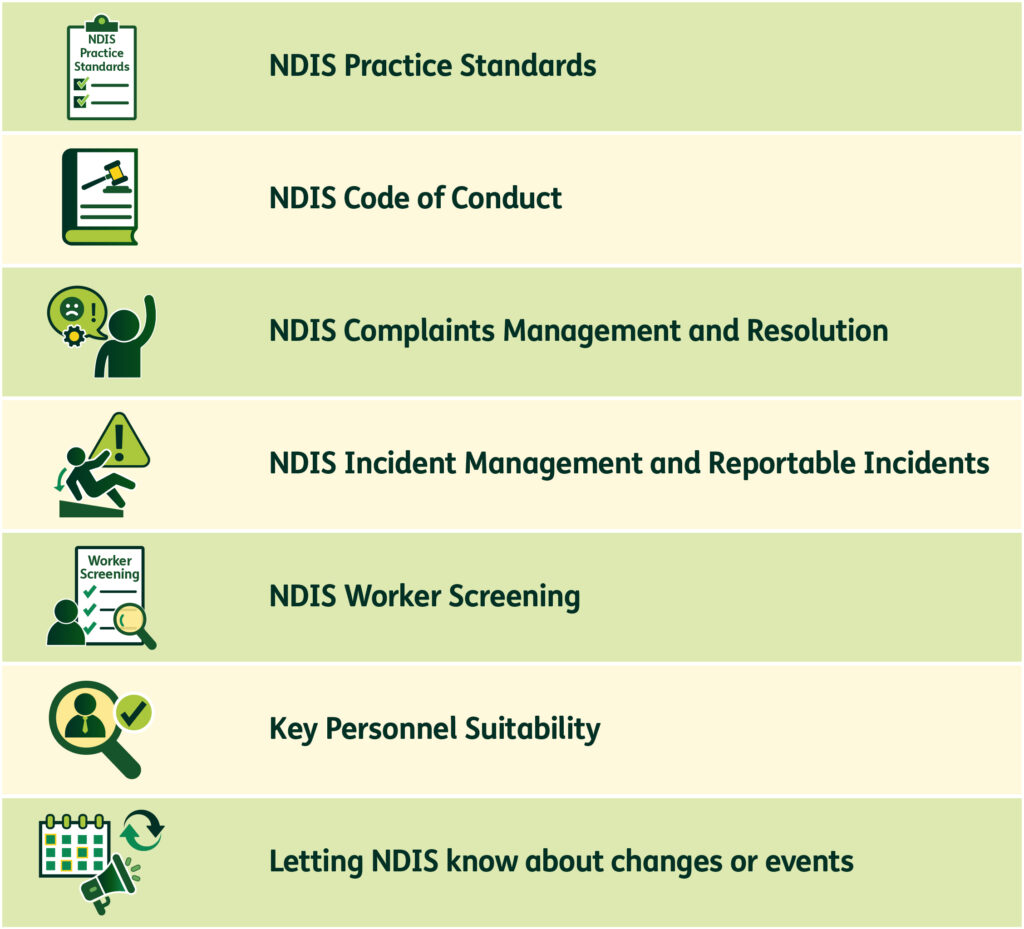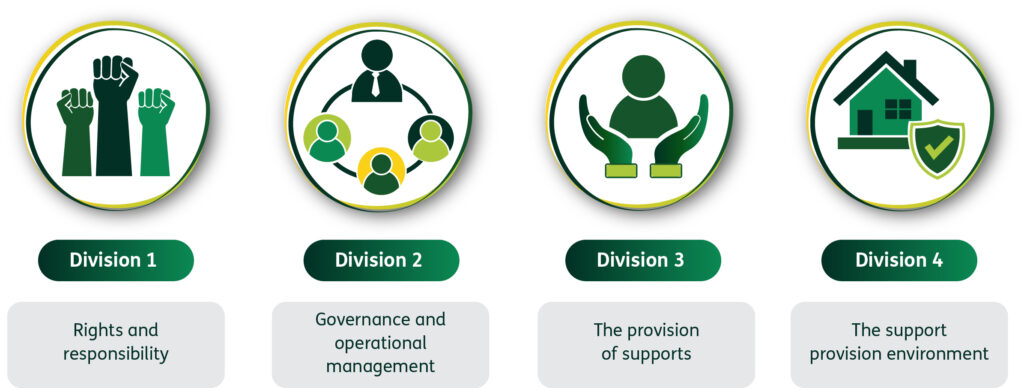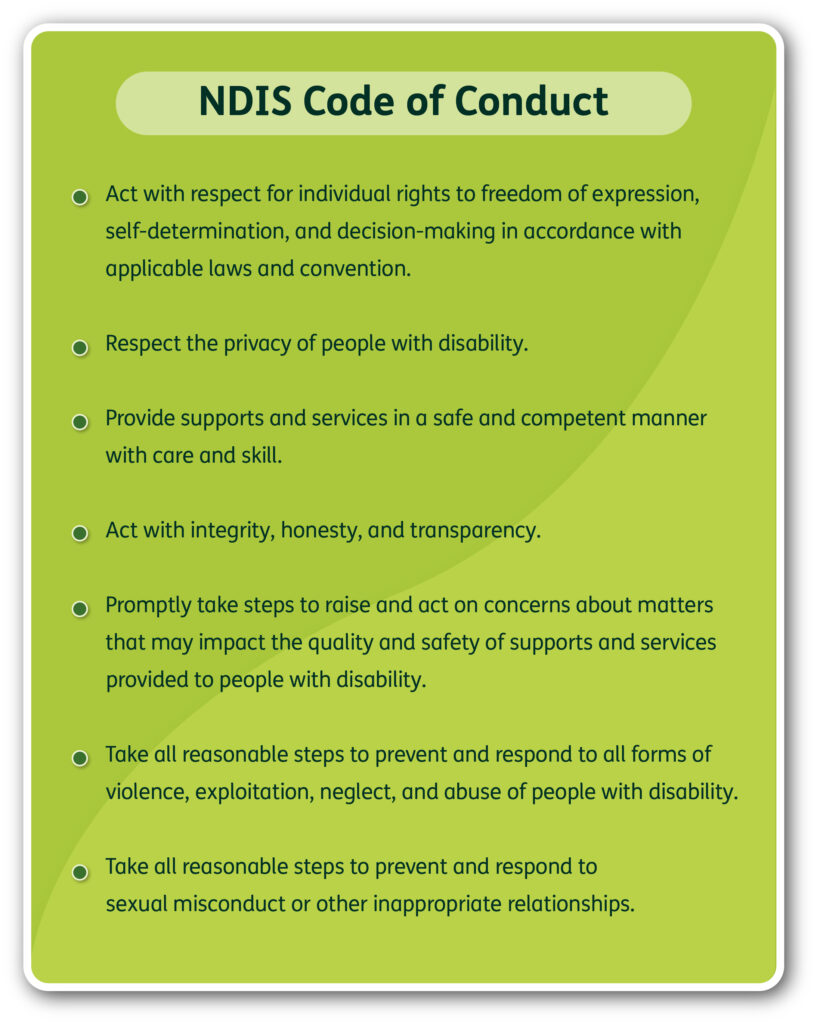If you need to register your service-for-one, there are requirements you will need to meet as a registered provider. This page will give you an overview of what these requirements are so that you can think about how they apply in your service-for-one.
It may feel overwhelming to think about all the things you need to do to register. But you could find that you are already doing a lot of these things as part of the way you provide support to your family member.
The requirements

The NDIS Practice Standards
The NDIS Practice Standards are legal requirements for NDIS service providers. They set the standards that services for NDIS participants need to meet.
The NDIS Practice Standards have a core module and several supplementary modules. All providers need to follow the core module.
If you need to register because you are using regulated restrictive practices in your service-for-one, you will need to meet the NDIS Practice Standards in these modules:
- the NDIS Core Module
- Module 2A (Implementing behaviour support plans).
Some services-for-one may also provide other supports and services such as high intensity supports (e.g. complex bowel care) or Specialist Disability Accommodation (SDA). If you are providing these supports, you will need to do extra modules of the Practice Standards. In this guide, we have only focused on the NDIS Core Module and Module 2A.
You can find out more about the modules on the NDIS Commission website.
Proportionality
The term proportionality is a key idea in NDIS registration. It means that the things you need to do to register are in proportion to the size, scale and type of supports you provide. So, if you are providing a service for just one person, you will need different systems and processes than what a large organisation supporting hundreds of people with disability will need. For example, a large organisation may have a complex system to keep track of staff training. A service-for-one may use a simple spreadsheet to record the name and date of staff training and when it needs to be updated.
The core module
All services-for-one going through the NDIS registration process will need to meet the core module of the NDIS Practice Standards. The core module has four divisions:

Each division has a list of NDIS Practice Standards. The NDIS Practice Standards listed in each division include an outcome and a set of indicators. The outcome is the planned result for the person with disability receiving NDIS-funded supports. The indicators help your service-for-one show how you meet the requirements.
For example, Division 1, is about respecting and upholding a person’s rights and making sure they are safe.
The outcomes in this division are about the person having:
- person-centred supports
- their individual personal beliefs, cultures, and values respected
- their privacy and dignity upheld
- increased independence and support to make informed choices
- freedom from violence, abuse, neglect, exploitation or discrimination.
The indicators for person-centred supports include:
- The person’s legal and human rights are understood and included in everyday practice.
- Communication with the person is provided in a way they understand and is responsive to their needs.
- The person is supported to connect with their family, friends and community in the way they want.
For example, how will the person’s wishes be supported where their values or beliefs differ from their family’s?
During registration, services-for-one will need to show evidence that they are meeting each of the outcomes and indicators in the core module. You can read more about this at Meeting the NDIA practice standards.
Module 2A: Implementing behaviour support plans
Supplementary Module 2A is about implementing behaviour support plans. All services-for-one using regulated restrictive practices must comply with this module.
We have summarised the roles services-for-one have under Module 2A in the table below.
1. Develop a behaviour support plan
- An NDIS behaviour support practitioner collects information for the behaviour assessment.
- Services-for-one work with the behaviour support practitioner to develop the person’s behaviour support plan.
2. Implementing and supporting the plan
- Services-for-one get authorisation to use the restrictive practices from their state or territory government.
- Services-for-one use restrictive practices only as included in the behaviour support plan.
- Services-for-one make sure they train all staff in the support strategies in the behaviour support plan.
3. Monitoring and reporting
- Services-for-one provide monthly reports to the NDIS Commission that includes all the restrictive practices they have used.
- Services-for-one report any unauthorised use of restrictive practices to the NDIS Commission as reportable incidents.
4. Reviewing and evaluating the behaviour support plan
- Services-for-one monitor the use of the behaviour support plan, records information and collects data.
- An NDIS behaviour support practitioner reviews support plans each year.
- Services-for-one work with the NDIS behaviour support practitioner to review strategies in the behaviour support plan.
During registration, you will need to show evidence that your service-for-one is meeting each of the outcomes and indicators in Module 2A.
There is a useful video on the responsibilities of implementing providers, which includes services-for-one providers who are using regulated restrictive practices. You can find it on the NDIS Quality and Safeguards Commission YouTube channel.
You can also find detailed information about restrictive practices from the NDIS Quality and Safeguards Commission (the NDIS Commission). This includes its Regulated Restrictive Practices Guide and the Behaviour Support page of the NDIS Commission website.
The NDIS Code of Conduct
The NDIS Code of Conduct is a set of expectations for how NDIS providers and workers should act. It sets clear and enforceable expectations for how supports and services are to be delivered. Enforceable means that the NDIS Commission can take actions against you if you do not meet these expectations.

Services-for-one must:
- help workers to understand and apply the Code of Conduct in their daily work
- apply the Code of Conduct in the way they operate.
If there is a complaint or a serious incident, the NDIS Commission will consider if the service-for-one is complying with the Code of Conduct.
Your policies and procedures should clearly show how you apply the Code of Conduct in all parts of the service you provide.
The NDIS Commission has a range of Code of Conduct guidance documents for providers and workers on its website.
All workers and key personnel from a registered NDIS provider must do the online Quality, Safety and You worker orientation program.
It is an interactive online course presented by people with disability. It explains the obligations of workers under the NDIS Code of Conduct.
The module takes about 90 minutes to do. Once workers have completed it, they will receive a Certificate of Completion. Auditors will want to see the certificates as part of evidence for the Code of Conduct.
Complaints management
Even when you are only providing support to one person, you need to have a system to manage and resolve complaints. This will help you to comply with the NDIS (Complaints Management and Resolution) Rules 2018. It does not need to be a complicated system.
To meet the NDIS Commission requirements, you need to show that:
- the person you are supporting knows how to make a complaint about their services and that they are supported to make a complaint if they want to
- the person making the complaint, and any person with disability affected by issues in a complaint, are included throughout the process as much as possible
- any person must be able to make a complaint, including anonymously
- all workers must know about, be trained in, and comply with the complaints management process.
Your complaint management system must also:
- meet your obligations in a way that works best for the person you are supporting
- be in the format that best suits the needs of the person, e.g., Easy English
- make sure the person knows about and are supported to access other ways to make a complaint, including complaints to the NDIS Commission
- provide appropriate support to anyone who wants to make, or has made, a complaint. This includes providing accessible information about advocacy agencies
- keep all people involved in the complaint up to date with the complaint’s progress
- include a clearly recorded process to receive and resolve complaints
- keep records of all the complaints you receive for at least seven years
- be reviewed regularly, with input from person with disability and workers
- include systems that allow you to review the complaints process and any outcomes.
You can find detailed information on how to deal with and resolve complaints on the Complaints management page of the NDIS Commission website.
You can watch the Complaints Commissioner from the NDIS Commission talk about complaints on the NDIS Commission website.
Incident management
You need to have a system in place so that you can let the NDIS Commission know about any reportable incidents. This will help you to comply with the NDIS (Incident Management and Reportable Incident) Rules 2018.
A reportable incident is a serious incident, like a serious injury or death of an NDIS participant, that happens in relation to the NDIS-funded supports and services you provide. This includes any allegations or accusations that an incident has happened.
The use of a restrictive practice that is not in a plan and/or not authorised is a reportable incident and must be reported to the NDIS Commission.
You need to have internal processes to manage and record all incidents, including minor injury or property damage, not just the ones you need to report to the NDIS Commission.
The processes you set up to manage incidents must:
- show what you have done to stop similar incidents from happening again
- be written down and easily accessible to all the workers you employ, as well as to the person with disability you support
- be proportionate for the size and the types of supports or services you deliver. It may be a simple log with the time, date, details of who was there and what happened, and any follow up actions that were taken.
When you report an incident to the NDIS Commission, it will decide whether you need to take any action. This could include:
- requiring you to take remedial action (including securing the immediate safety of the person with disability)
- carrying out an investigation yourself
- getting an independent expert to investigate.
Reporting an incident to the NDIS Commission does not replace the need to report suspected crimes to the police and other authorities.
All workers must be trained in managing and reporting incidents. The NDIS Commission has produced an online module for new workers on Incident Management. It does not replace any specific training about your policies, procedures and work practices. You can find the module on the NDIS Commission website.
You can also find detailed information about incident reporting on the Reportable incidents page of the NDIS Commission website.
Worker screening
If you are employing staff directly you will need to comply with the worker screening requirements in the NDIS (Worker Screening) Rules 2018.
This means that workers that are in risk assessed roles must go through an NDIS Worker Screening Check and have a suitable clearance.
Risk assessed roles are:
- key personnel roles (e.g. managers and company directors)
- roles where the normal duties include the direct delivery of supports and services to a person with disability
- roles where the normal duties require more than incidental contact with the person with disability – this means the worker has regular and direct contact with the person with disability.
For services-for-one, this is likely to include allworkers and key personnel (see page 14). This is because of their direct contact with the person receiving support.
You need to keep detailed records on each worker in a risk assessed role, including:
- the full name, date of birth and address of the person
- the roles the person does
- if the worker does not have an NDIS worker screening clearance:
- explain why they can work in a risk assessed role
- include the start and end date of when the exception applied (read about exceptions to worker screening requirements on the NDIS Commission website)
- include the name of the person who supervised the worker during this time
- the worker’s NDIS Worker Screening Check application reference number
- the worker’s NDIS Worker Screening Check outcome expiry date
- records relating to an interim bar, a suspension, or an exclusion applying to the worker, and anything the provider has done relating to these kinds of decisions
- accusations of misconduct and what you did in response to that accusation.
You can find information on the Worker Screening requirements and when they apply on the NDIS Commission website.
Key personnel suitability
Key personnel are the people who have key executive, management or operational positions in each service-for-one. They can include managers, a chief executive officer, company directors, board members, or a chairperson (if you have them).
Key personnel do not include support workers (unless the support worker is also a chairperson or director etc). All services-for-one must include all its key personnel in its registration application. This will be part of the NDIS Commission’s suitability assessment.
The suitability assessment looks at if the service-for-one or its key personnel have:
- been a registered NDIS provider before
- had a banning order stopping them from providing NDIS supports and services
- any past convictions of an indictable offence, such as theft or assault
- been insolvent (unable to pay debts), under administration or bankrupt
- had adverse findings or enforcement action taken by any government authority
- been the subject of any findings or judgement of fraud, misrepresentation or dishonesty in any civil, criminal or administrative proceedings
- been disqualified from managing corporations.
The NDIS Commission can decide not to register your service-for-one if any of these requirements are not met.
Letting the NDIS Commission know about any changes or events that affect your registration
You must let the NDIS Commission know through the NDIS Commission Portal of certain changes and events. This is especially important if those changes affect your ability to provide services. These changes or events could include:
- a significant shortfall in available workers
- a change in your legal entity type or business structure.
Mandatory training requirements
Some worker training is mandatory as part of the NDIS Code of Conduct, Practice Standards and supplementary modules.
Mandatory training includes:
- A compulsory worker orientation module (Quality, Safety and You) for all employees – this covers human rights, respect and risk, and the roles and responsibilities of NDIS workers. You can find this module on the NDIS Commission website.
- Training about:
- staff obligations under the NDIS Practice Standards and NDIS Rules
- how to handle complaints and manage incidents
- how to manage medication (if relevant)
- how to manage waste and hazardous substances (if relevant)
- any clinical support a person needs (e.g. complex bowel care)
- reducing and eliminating restrictive practices, including using strategies in behaviour support plans.
There are also other online Induction Modules. These are not mandatory, but are recommended for workers that are new to the disability sector. These eight online modules include:
- disability awareness
- privacy and confidentiality
- safe workplace
- NDIS Code of Conduct and dignity of risk
- incident management
- know the person
- identifying and managing risk
- managing challenging situations.
It is good practice to keep a register to keep a record of staff training. This register will also form a key piece of evidence to help you meet your registration requirements. It does not need to be complicated. It can be a simple spreadsheet with worker names and dates for completion of training. You will also need to keep copies of training certificates.
What’s next?
You can find out more about how to apply for NDIS registration at How do you register as an NDIS provider? You can also find out more about how to provide evidence that you are meeting your NDIS registration requirements at Meeting the NDIS practice standards.
